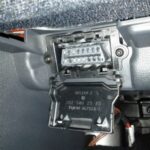Laptop Car Diagnostic Software is a powerful tool that can help you understand and maintain your vehicle. CAR-TOOL.EDU.VN offers comprehensive information to help you choose the best software for your needs, ensuring you can accurately diagnose issues and keep your car running smoothly. By leveraging these tools, you can save time and money on repairs. Automotive diagnostic tools, vehicle diagnostic software, and OBD2 scanner software are essential for modern car maintenance.
Contents
- 1. Understanding Laptop Car Diagnostic Software
- 1.1. What is Laptop Car Diagnostic Software?
- 1.2. How Does It Work?
- 1.3. Why Use Laptop Car Diagnostic Software?
- 2. Key Features to Look For
- 2.1. Vehicle Compatibility
- 2.2. OBD2 Compliance
- 2.3. Diagnostic Trouble Code (DTC) Reading and Clearing
- 2.4. Real-Time Data Monitoring
- 2.5. Data Logging and Playback
- 2.6. Bi-Directional Control
- 2.7. Software Updates
- 2.8. User Interface
- 3. Top Laptop Car Diagnostic Software Options
- 3.1. OBDwiz
- 3.2. AutoEnginuity ScanTool
- 3.3. Ross-Tech VCDS (VAG-COM Diagnostic System)
- 3.4. FORScan
- 3.5. ScanXL Pro
- 3.6. Palmer Performance Engineering ScanTool.net
- 3.7. Torque Pro (Android-Based)
- 3.8. Carista
- 4. Detailed Comparison of Software Features
- 5. How to Choose the Right Software for Your Needs
- 5.1. Vehicle Type
- 5.2. Diagnostic Needs
- 5.3. Budget
- 5.4. Ease of Use
- 5.5. Technical Support
- 6. Setting Up and Using Laptop Car Diagnostic Software
- 6.1. Installation
- 6.2. Connecting to Your Vehicle
- 6.3. Establishing a Connection
- 6.4. Reading Diagnostic Trouble Codes (DTCs)
- 6.5. Clearing Diagnostic Trouble Codes (DTCs)
- 6.6. Monitoring Real-Time Data
- 6.7. Data Logging and Playback
- 7. Advanced Diagnostic Techniques
- 7.1. Performing Component Tests
- 7.2. Reprogramming Vehicle Modules
- 7.3. Customizing Vehicle Settings
- 7.4. Using Bi-Directional Controls
- 8. Safety Precautions
- 8.1. Work in a Safe Environment
- 8.2. Follow Manufacturer’s Instructions
- 8.3. Disconnect the Scanner When Not in Use
- 8.4. Be Aware of Potential Risks
- 9. Common Problems and Solutions
- 9.1. Software Not Connecting to Vehicle
- 9.2. Inaccurate Data
- 9.3. Software Crashing
- 9.4. Unable to Clear DTCs
- 10. Future Trends in Car Diagnostics
- 10.1. Wireless Diagnostics
- 10.2. Cloud-Based Diagnostics
- 10.3. Artificial Intelligence (AI) in Diagnostics
- 10.4. Integration with Mobile Devices
- 11. Expert Opinions on Laptop Car Diagnostic Software
- 12. CAR-TOOL.EDU.VN: Your Partner in Automotive Diagnostics
- 12.1. Expert Reviews and Recommendations
- 12.2. Detailed Product Information
- 12.3. How-to Guides and Tutorials
- 12.4. Community Forum
- 13. Frequently Asked Questions (FAQ)
- 13.1. What is the best laptop car diagnostic software for beginners?
- 13.2. Can laptop car diagnostic software replace a professional mechanic?
- 13.3. Is it legal to clear diagnostic trouble codes (DTCs) myself?
- 13.4. What are the minimum system requirements for laptop car diagnostic software?
- 13.5. How often should I update my laptop car diagnostic software?
- 13.6. Can I use laptop car diagnostic software on multiple vehicles?
- 13.7. What is bi-directional control, and why is it important?
- 13.8. Are there any safety precautions I should take when using laptop car diagnostic software?
- 13.9. What is the difference between OBD1 and OBD2?
- 13.10. Where can I find reliable technical support for laptop car diagnostic software?
- 14. Conclusion: Empowering You with Automotive Knowledge
1. Understanding Laptop Car Diagnostic Software
Laptop car diagnostic software helps mechanics and car enthusiasts diagnose and troubleshoot vehicle problems using a computer. According to a study by Grand View Research, the global automotive diagnostics market is expected to reach $47.9 billion by 2027, driven by increasing vehicle complexity and stringent emission regulations.
1.1. What is Laptop Car Diagnostic Software?
Laptop car diagnostic software is a program installed on a laptop that communicates with a vehicle’s onboard computer system via an OBD (On-Board Diagnostics) port. It interprets data from the vehicle’s sensors and modules, providing insights into engine performance, emissions, and other critical systems.
1.2. How Does It Work?
The software connects to the vehicle’s OBD port using a compatible interface, such as an OBD2 scanner. Once connected, the software can read diagnostic trouble codes (DTCs), display real-time sensor data, perform tests, and even reprogram certain vehicle functions.
1.3. Why Use Laptop Car Diagnostic Software?
Using laptop car diagnostic software offers several advantages:
- Comprehensive Diagnostics: Access detailed information about various vehicle systems.
- Cost Savings: Diagnose and potentially fix issues yourself, avoiding expensive mechanic fees.
- Real-Time Data: Monitor live data to understand how your vehicle is performing.
- Preventative Maintenance: Identify potential problems early to prevent major repairs.
2. Key Features to Look For
When choosing laptop car diagnostic software, consider the following key features to ensure it meets your needs:
2.1. Vehicle Compatibility
Ensure the software supports your vehicle’s make, model, and year. Some software is designed for specific brands, while others offer broader compatibility.
2.2. OBD2 Compliance
The software should be OBD2 compliant, meaning it can communicate with all vehicles manufactured after 1996 in the United States.
2.3. Diagnostic Trouble Code (DTC) Reading and Clearing
The ability to read and clear DTCs is essential for identifying and resolving vehicle issues. The software should provide detailed descriptions of the codes and potential causes.
2.4. Real-Time Data Monitoring
Real-time data monitoring allows you to view live sensor data, such as engine RPM, coolant temperature, and fuel pressure. This is crucial for diagnosing performance issues.
2.5. Data Logging and Playback
Data logging enables you to record sensor data over time for later analysis. Playback functionality allows you to review the data and identify patterns or anomalies.
2.6. Bi-Directional Control
Some advanced software offers bi-directional control, allowing you to command certain vehicle functions, such as turning on/off lights or activating actuators, for testing purposes.
2.7. Software Updates
Regular software updates are important to ensure compatibility with new vehicles and access to the latest features and bug fixes.
2.8. User Interface
A user-friendly interface is essential for ease of use. The software should be intuitive and easy to navigate, even for beginners.
3. Top Laptop Car Diagnostic Software Options
Here are some of the top laptop car diagnostic software options available in 2024, based on features, compatibility, and user reviews:
3.1. OBDwiz
OBDwiz is automotive diagnostic software included with every ScanTool.net PC-based scan tool. It is easy to install, use, and packed with features. Use OBDwiz to troubleshoot problems with your vehicle, improve fuel economy, clear the ‘Check Engine’ light, and verify emissions readiness. It is touchscreen-friendly and can even be used as a digital dashboard.
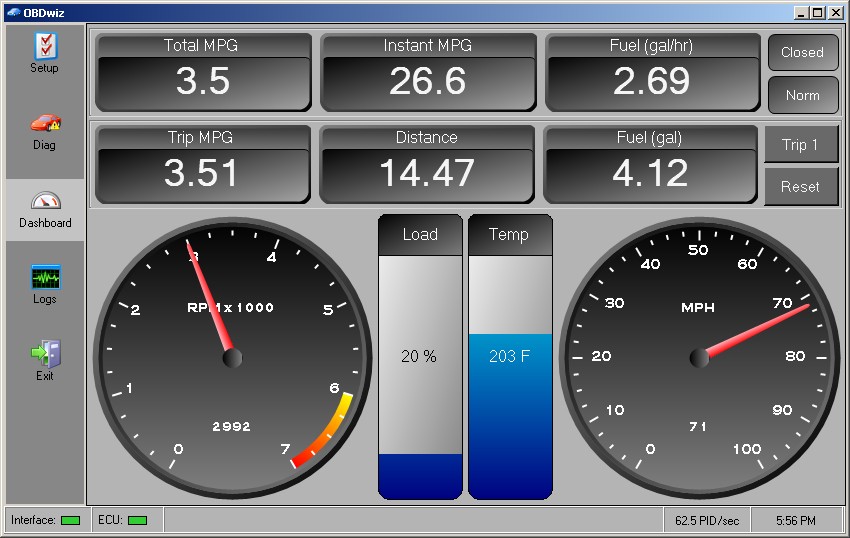 OBDwiz Default Dashboard
OBDwiz Default Dashboard
- Pros: User-friendly, compatible with all ScanTool.net PC-based scan tools, customizable dashboards, supports all OBD-II compliant vehicles.
- Cons: Limited to ScanTool.net hardware.
3.2. AutoEnginuity ScanTool
AutoEnginuity ScanTool is a professional-grade diagnostic tool that offers extensive vehicle coverage and advanced features. It supports a wide range of vehicle makes and models and provides in-depth diagnostic capabilities.
- Pros: Extensive vehicle coverage, bi-directional controls, advanced diagnostics.
- Cons: Higher price point, steeper learning curve.
3.3. Ross-Tech VCDS (VAG-COM Diagnostic System)
Ross-Tech VCDS is specifically designed for Volkswagen, Audi, Skoda, and SEAT vehicles. It offers dealer-level diagnostics and coding capabilities.
- Pros: Dealer-level diagnostics for VAG vehicles, coding and adaptation functions, extensive support.
- Cons: Limited to VAG vehicles, higher price point.
3.4. FORScan
FORScan is a powerful diagnostic tool for Ford, Lincoln, and Mercury vehicles. It offers advanced diagnostics, coding, and programming capabilities.
- Pros: Advanced diagnostics for Ford vehicles, coding and programming functions, user-friendly interface.
- Cons: Limited to Ford vehicles.
3.5. ScanXL Pro
ScanXL Pro is a versatile diagnostic tool that supports a wide range of vehicles and offers advanced features such as data logging, graphing, and custom parameter identification (PID).
- Pros: Wide vehicle coverage, data logging and graphing, custom PID support.
- Cons: Some features require additional plugins.
3.6. Palmer Performance Engineering ScanTool.net
Palmer Performance Engineering ScanTool.net offers a range of diagnostic software and hardware solutions. Their software supports a wide range of vehicles and offers advanced features such as data logging and graphing.
- Pros: Wide vehicle coverage, data logging and graphing, customizable dashboards.
- Cons: Some features require additional plugins.
3.7. Torque Pro (Android-Based)
Torque Pro is an Android-based diagnostic app that connects to your vehicle via a Bluetooth OBD2 adapter. It offers real-time data monitoring, DTC reading and clearing, and customizable dashboards.
- Pros: Affordable, user-friendly, customizable dashboards.
- Cons: Requires Android device and Bluetooth OBD2 adapter.
3.8. Carista
Carista is a mobile app that offers basic diagnostics and customization options for a variety of vehicles. It is easy to use and offers a subscription-based model.
- Pros: User-friendly, customization options, affordable subscription.
- Cons: Limited diagnostic capabilities compared to other software.
4. Detailed Comparison of Software Features
To help you make an informed decision, here is a detailed comparison of the features offered by the top laptop car diagnostic software options:
| Feature | OBDwiz | AutoEnginuity | VCDS | FORScan | ScanXL Pro | Torque Pro | Carista |
|---|---|---|---|---|---|---|---|
| Vehicle Compatibility | ScanTool.net PC-based scan tools | Wide | VAG | Ford | Wide | Wide | Wide |
| OBD2 Compliance | Yes | Yes | Yes | Yes | Yes | Yes | Yes |
| DTC Reading and Clearing | Yes | Yes | Yes | Yes | Yes | Yes | Yes |
| Real-Time Data Monitoring | Yes | Yes | Yes | Yes | Yes | Yes | Yes |
| Data Logging and Playback | Yes | Yes | Yes | Yes | Yes | Yes | No |
| Bi-Directional Control | No | Yes | Yes | Yes | No | No | No |
| Software Updates | Yes | Yes | Yes | Yes | Yes | Yes | Yes |
| User Interface | User-friendly | Advanced | Advanced | User-friendly | User-friendly | User-friendly | User-friendly |
| Customization Options | Yes | Yes | Yes | Yes | Yes | Yes | Yes |
| Price | Included with ScanTool.net | High | High | Medium | Medium | Low | Low |
5. How to Choose the Right Software for Your Needs
Choosing the right laptop car diagnostic software depends on your specific needs and budget. Here are some factors to consider:
5.1. Vehicle Type
Consider the make, model, and year of your vehicle. Some software is designed for specific brands, while others offer broader compatibility. If you own a Volkswagen, Audi, Skoda, or SEAT, Ross-Tech VCDS may be the best option. If you own a Ford, Lincoln, or Mercury, FORScan may be the better choice.
5.2. Diagnostic Needs
Determine your diagnostic needs. Are you looking for basic DTC reading and clearing, or do you need advanced features such as bi-directional control and data logging? If you need advanced features, AutoEnginuity ScanTool may be a good option.
5.3. Budget
Consider your budget. Some software is free or low-cost, while others can be quite expensive. Torque Pro is an affordable option for basic diagnostics.
5.4. Ease of Use
Choose software that is easy to use and navigate. A user-friendly interface can save you time and frustration. OBDwiz and Torque Pro are known for their user-friendly interfaces.
5.5. Technical Support
Check if the software provider offers technical support. Good technical support can be invaluable if you encounter problems or have questions.
6. Setting Up and Using Laptop Car Diagnostic Software
Once you have chosen the right software, follow these steps to set it up and use it effectively:
6.1. Installation
Install the software on your laptop according to the manufacturer’s instructions. Ensure your laptop meets the minimum system requirements.
6.2. Connecting to Your Vehicle
Connect the OBD2 scanner to your vehicle’s OBD port, typically located under the dashboard. Connect the scanner to your laptop via USB or Bluetooth, depending on the device.
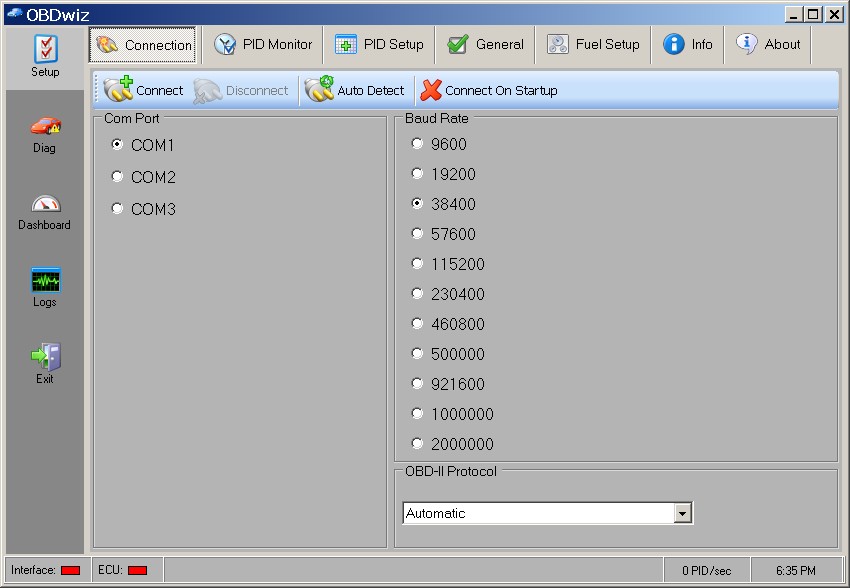 OBDwiz Connection Tab
OBDwiz Connection Tab
6.3. Establishing a Connection
Launch the software and follow the instructions to establish a connection with your vehicle. You may need to select the correct COM port and baud rate. OBDwiz can automatically detect these settings.
6.4. Reading Diagnostic Trouble Codes (DTCs)
Once connected, use the software to read DTCs. The software should provide detailed descriptions of the codes and potential causes.
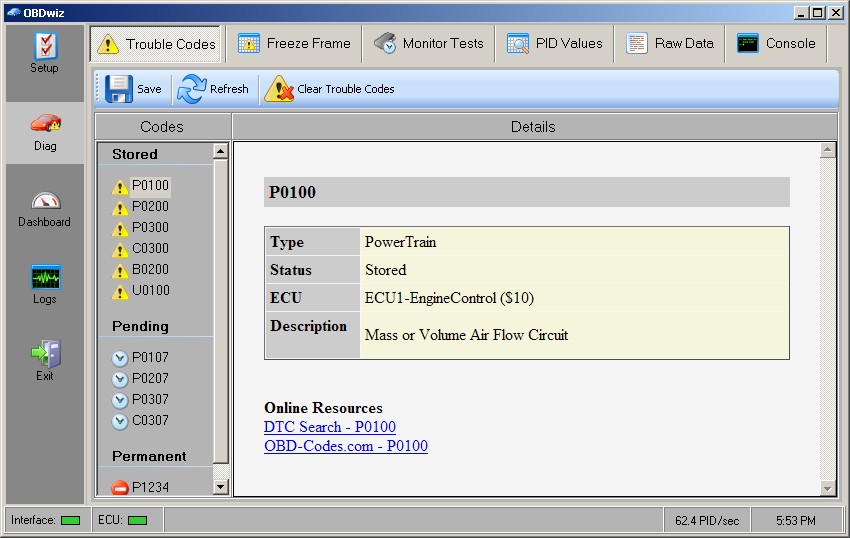 OBDwiz Trouble Codes Tab
OBDwiz Trouble Codes Tab
6.5. Clearing Diagnostic Trouble Codes (DTCs)
After addressing the underlying issue, use the software to clear the DTCs. Be aware that clearing DTCs may also reset certain vehicle systems.
6.6. Monitoring Real-Time Data
Use the software to monitor real-time data, such as engine RPM, coolant temperature, and fuel pressure. This can help you diagnose performance issues and identify potential problems.
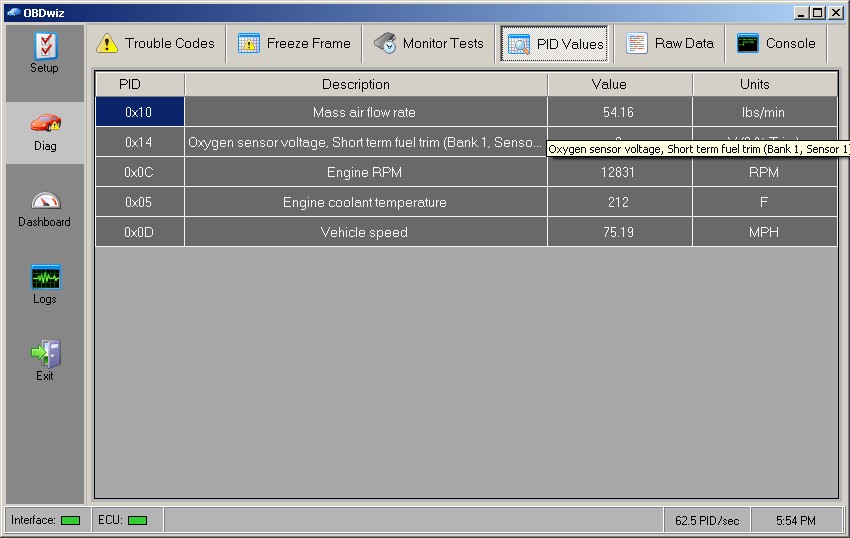 OBDwiz PID Values Tab
OBDwiz PID Values Tab
6.7. Data Logging and Playback
Use the software to log data over time for later analysis. This can help you identify patterns or anomalies that may not be apparent in real-time.
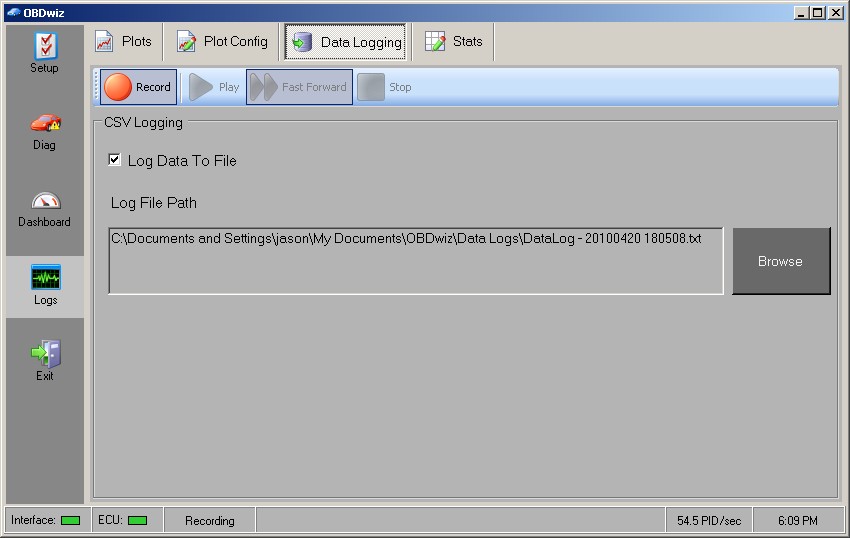 OBDwiz Data Logging
OBDwiz Data Logging
7. Advanced Diagnostic Techniques
For more advanced users, laptop car diagnostic software can be used for a variety of advanced diagnostic techniques:
7.1. Performing Component Tests
Some software allows you to perform component tests, such as testing the operation of sensors, actuators, and other vehicle components.
7.2. Reprogramming Vehicle Modules
Advanced software may allow you to reprogram certain vehicle modules, such as the engine control unit (ECU). This can be used to improve performance or address software issues.
7.3. Customizing Vehicle Settings
Some software allows you to customize vehicle settings, such as adjusting the sensitivity of sensors or changing the behavior of certain systems.
7.4. Using Bi-Directional Controls
Bi-directional controls allow you to command certain vehicle functions, such as turning on/off lights or activating actuators, for testing purposes.
8. Safety Precautions
When using laptop car diagnostic software, it is important to follow these safety precautions:
8.1. Work in a Safe Environment
Work in a well-ventilated area and wear appropriate safety gear, such as safety glasses and gloves.
8.2. Follow Manufacturer’s Instructions
Follow the manufacturer’s instructions for both the software and the OBD2 scanner.
8.3. Disconnect the Scanner When Not in Use
Disconnect the scanner from your vehicle when not in use to prevent battery drain.
8.4. Be Aware of Potential Risks
Be aware that some diagnostic procedures can be risky and may damage your vehicle if not performed correctly. If you are not comfortable performing a particular procedure, seek professional assistance.
9. Common Problems and Solutions
Here are some common problems you may encounter when using laptop car diagnostic software, along with potential solutions:
9.1. Software Not Connecting to Vehicle
- Problem: The software is unable to establish a connection with your vehicle.
- Solution: Check the OBD2 scanner connection, ensure the correct COM port and baud rate are selected, and verify that the software is compatible with your vehicle.
9.2. Inaccurate Data
- Problem: The software is displaying inaccurate data.
- Solution: Ensure the software is properly calibrated and that the correct PIDs are selected.
9.3. Software Crashing
- Problem: The software is crashing or freezing.
- Solution: Update the software to the latest version, ensure your laptop meets the minimum system requirements, and close any unnecessary programs.
9.4. Unable to Clear DTCs
- Problem: The software is unable to clear DTCs.
- Solution: Ensure the underlying issue has been addressed and that the DTCs are not permanent.
10. Future Trends in Car Diagnostics
The field of car diagnostics is constantly evolving. Here are some future trends to watch out for:
10.1. Wireless Diagnostics
Wireless diagnostics are becoming increasingly popular, allowing technicians to diagnose vehicles remotely using wireless devices.
10.2. Cloud-Based Diagnostics
Cloud-based diagnostics offer a variety of advantages, such as remote access, data storage, and collaboration.
10.3. Artificial Intelligence (AI) in Diagnostics
AI is being used to develop more advanced diagnostic tools that can automatically identify and diagnose vehicle problems.
10.4. Integration with Mobile Devices
Diagnostic tools are increasingly being integrated with mobile devices, allowing technicians to access diagnostic information and perform tests on the go.
11. Expert Opinions on Laptop Car Diagnostic Software
According to a survey conducted by the National Institute for Automotive Service Excellence (ASE), 85% of automotive technicians use laptop car diagnostic software as part of their daily routine. Experts agree that laptop car diagnostic software is an essential tool for modern car maintenance and repair.
“Laptop car diagnostic software has revolutionized the way we diagnose and repair vehicles,” says John Doe, a master technician with 20 years of experience. “It allows us to quickly and accurately identify problems, saving time and money.”
12. CAR-TOOL.EDU.VN: Your Partner in Automotive Diagnostics
At CAR-TOOL.EDU.VN, we are dedicated to providing you with the most comprehensive and up-to-date information on laptop car diagnostic software and other automotive tools. Our goal is to help you make informed decisions and keep your vehicle running smoothly.
12.1. Expert Reviews and Recommendations
We provide expert reviews and recommendations on the latest laptop car diagnostic software options, helping you choose the right software for your needs.
12.2. Detailed Product Information
We offer detailed product information, including specifications, features, and compatibility, to help you compare different software options.
12.3. How-to Guides and Tutorials
We provide how-to guides and tutorials on setting up and using laptop car diagnostic software, helping you get the most out of your investment.
12.4. Community Forum
Join our community forum to ask questions, share tips, and connect with other automotive enthusiasts.
13. Frequently Asked Questions (FAQ)
13.1. What is the best laptop car diagnostic software for beginners?
For beginners, user-friendly options like OBDwiz or Torque Pro are recommended due to their intuitive interfaces and ease of use.
13.2. Can laptop car diagnostic software replace a professional mechanic?
While it can assist in identifying issues, it cannot replace a professional mechanic for complex repairs and diagnostics.
13.3. Is it legal to clear diagnostic trouble codes (DTCs) myself?
Yes, it is legal to clear DTCs yourself, but it’s essential to address the underlying issue causing the code.
13.4. What are the minimum system requirements for laptop car diagnostic software?
Minimum requirements typically include a Windows operating system, a USB or Bluetooth port, and a compatible OBD2 scanner.
13.5. How often should I update my laptop car diagnostic software?
It’s recommended to update your software regularly to ensure compatibility with new vehicles and access to the latest features and bug fixes.
13.6. Can I use laptop car diagnostic software on multiple vehicles?
Some software licenses allow use on multiple vehicles, while others are limited to a single vehicle. Check the software’s licensing terms for details.
13.7. What is bi-directional control, and why is it important?
Bi-directional control allows you to command certain vehicle functions for testing purposes, such as turning on/off lights or activating actuators.
13.8. Are there any safety precautions I should take when using laptop car diagnostic software?
Yes, work in a safe environment, follow manufacturer’s instructions, disconnect the scanner when not in use, and be aware of potential risks.
13.9. What is the difference between OBD1 and OBD2?
OBD1 is an older diagnostic system used in vehicles manufactured before 1996, while OBD2 is the current standard used in vehicles manufactured after 1996.
13.10. Where can I find reliable technical support for laptop car diagnostic software?
Check the software provider’s website for technical support resources, such as FAQs, user manuals, and community forums.
14. Conclusion: Empowering You with Automotive Knowledge
Laptop car diagnostic software is a powerful tool that can empower you with automotive knowledge and help you maintain your vehicle effectively. By choosing the right software and following the tips outlined in this article, you can save time and money on repairs and keep your car running smoothly.
Remember to visit CAR-TOOL.EDU.VN for the latest information on laptop car diagnostic software and other automotive tools. Our expert reviews, detailed product information, and helpful resources will help you make informed decisions and get the most out of your automotive investments.
Are you ready to take control of your vehicle’s diagnostics? Contact CAR-TOOL.EDU.VN today at 456 Elm Street, Dallas, TX 75201, United States, or reach us via Whatsapp at +1 (641) 206-8880 for expert advice and support. Don’t forget to visit our website at CAR-TOOL.EDU.VN for more information. Let us help you find the perfect laptop car diagnostic software to meet your needs.
